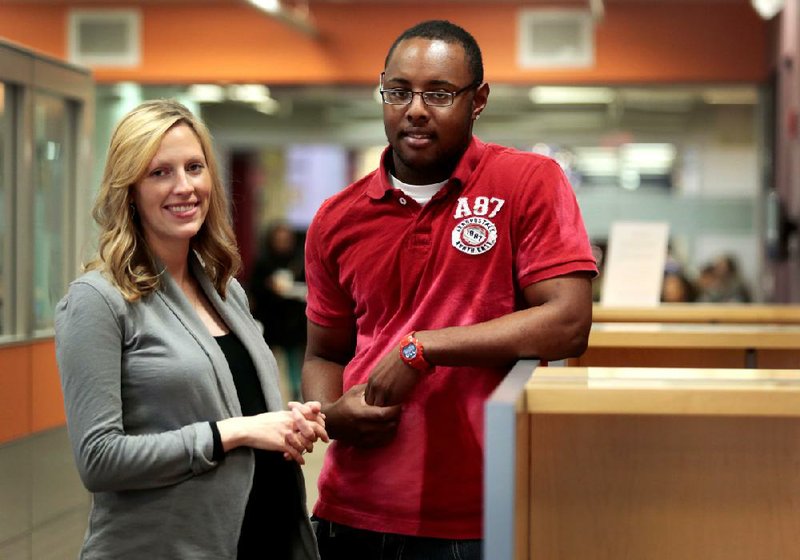The Walton Family Foundation is giving $2.1 million to help diversity programs at the University of Arkansas at Fayetteville.
“This is the largest gift the UA has ever received for diversity programs,” said Leslie Yingling, director of the UA’s College Access Initiative and Diversity Affairs Outreach.
Part of the money will provide “gap” funding for 47 graduates of public high schools in Phillips County - or graduates of open-enrollment charter schools across the state - to attend UA, Yingling said. By “gap” funding, Yingling means the grant will provide additional scholarship money necessary to attend UA, she said.
The grants will support underrepresented students, including minority-group students and those from low-income families who would be first-generation college graduates, she said.
Charles Robinson, vice chancellor for diversity and community, said the scholarships will go to students who have been admitted to UA and also receive federal Pell Grants.
The scholarships will be incentive for qualified students to attend UA rather than staying closer to home and attending a different college, Robinson said. Helena-West Helena, the seat of Phillips County, is on the Mississippi River, 301 miles from Fayetteville and closer to colleges in Mississippi and Tennessee.
This semester, UA has 72 undergraduate students from Phillips County, Yingling said.
Robinson said the grant will help ensure that students from economically depressed areas of Arkansas, like the Delta, are supported in their academic careers.
“This gift will allow our team to build relationships with these students and their school administrators while the students are still in high school in an effort to ensure long-term success,” he said.
Yingling said the students who receive these scholarships will be chosen based on a variety of criteria, and the amount of grant money they receive could vary depending on their situations.
Each student will receive money for four years of college. The funding will be provided over a six-year period beginning next year, when 15 students will be part of the program. Another 15 will be added in 2015 and 17 more in 2016.
One reason Phillips County was chosen is because KIPP Delta Collegiate High School in Helena-West Helena is already served by the program, Yingling said.
“The historic relationship that the foundation has with Phillips County makes it an important and likely target area,” she said. “We are eager to expand our work in Phillips County, where KIPP has been instrumental in helping us to develop our outreach partners and programming.”
The Knowledge is Power Program, or KIPP, is a national network of free, open-enrollment college-preparatory public schools dedicated to preparing students in underserved communities for college, according to its website, kipp.org.
Other counties could be the focus later on, Yingling said.
“We hope if it goes well, we can continue and expand the program,” she said.
The grant will also support college-readiness programming, Yingling said. It will cover the cost for 50 high school students to attend the UA’s summer program to prepare them to take the ACT test, a standard measure that universities use when assessing high school graduates who are applying to go to college. Normally, about 200 students attend the “ACT academy” each summer, but 250 will be able to attend next summer because of the grant, she said.
After spending a week on the Fayetteville campus during the “ACT academy,” prospective students from the Delta often decide to attend UA, Yingling said.
Students who are admitted to the university will be eligible for tutoring, mentoring and summer enrichment programs designed to increase both retention and graduation rates, she said.
Grant money will also be used to help current UA students from Phillips County through mentoring and retention programs, Yingling said.
Scott Shirey, executive director of Knowledge is Power Program in Helena-West Helena, is familiar with the foundation’s passion for educating children in the Delta.
“Transforming students’ lives through education is not an easy endeavor, and this grant will help these young adults have a better life than generations before them,” he said.
The Walton Family Foundation is dedicated to making a positive difference in three focus areas: K-12 education changes, freshwater and marine conservation, and quality-of-life initiatives, according to its website. In 2012, the foundation invested $432 million in domestic and international projects that addressed social and environmental issues.
Arkansas, Pages 10 on 12/16/2013

